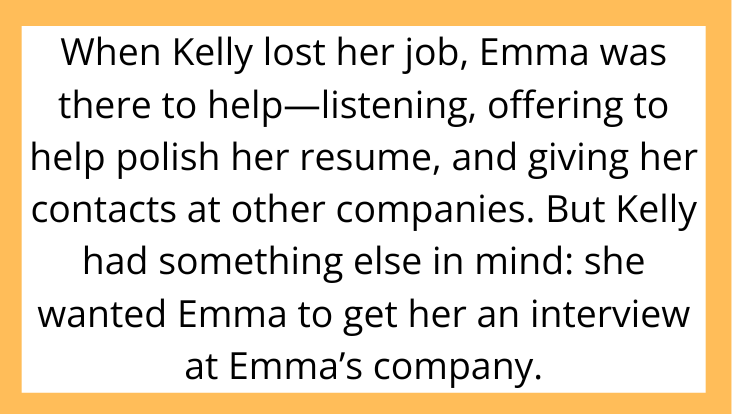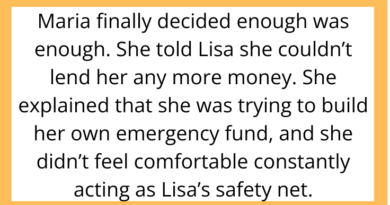AITAH for Not Giving My Best Friend a Job at My Company After She Lost Hers?
When friendship and professional boundaries collide, things can get complicated fast. In today’s AITAH scenario, a loyal friend is left feeling betrayed after being turned down for a job—and the internet is divided over who’s in the wrong.
Let’s break down the story and see where the line between compassion and professional responsibility really lies.
The Situation: A Friendship Tested by Job Loss

A Reddit user (let’s call her Emma) posted her dilemma in r/AITAH. Emma, 32, works as a project manager at a mid-sized tech company. She’s been with the company for six years and is well respected by her team and her boss.
Her best friend, Kelly, 33, was recently laid off from her marketing job after her company downsized. Emma and Kelly have been friends since college, supporting each other through countless ups and downs.
When Kelly lost her job, Emma was there to help—listening, offering to help polish her resume, and giving her contacts at other companies. But Kelly had something else in mind: she wanted Emma to get her an interview at Emma’s company.
Emma hesitated. While there was an opening in marketing, she knew Kelly’s work style didn’t always mesh well with others. Kelly often missed deadlines, struggled with feedback, and had a reputation (even among mutual connections) for blaming colleagues when projects went wrong. Emma worried that vouching for Kelly could hurt her own credibility if things didn’t work out.
So she gently told Kelly she wasn’t comfortable referring her but was happy to share job leads elsewhere.
Kelly was stunned—and furious.
The Fallout: Accusations and Hurt Feelings

Kelly accused Emma of being a “fake friend” and said she clearly didn’t care about her well-being. She claimed Emma was selfish and more worried about her reputation than helping someone she claimed to love like a sister.
Emma felt torn. She wanted to be there for her friend but also had to protect her professional relationships. She wrote to Reddit asking the question: Am I the villain for not referring my friend for a job at my company?
Reddit Responds: Whose Side Are You On?

The AITAH community jumped in fast, and the consensus was clear: Emma was not the villain.
Why Emma’s Boundaries Make Sense
-
Professional Reputation Matters
Referrals aren’t just passing along a resume—they’re an endorsement. If Kelly underperformed or created drama, it could damage Emma’s standing at work. -
Support Doesn’t Mean Sacrifice
Emma offered help in other ways: resume assistance, emotional support, networking elsewhere. Just because she didn’t do exactly what Kelly wanted doesn’t mean she didn’t care. -
Work and Friendship Aren’t Always Compatible
Not every friendship can (or should) transition into a professional relationship. Sometimes, protecting both the friendship and your career means saying no.
As one commenter put it:
“You’re not her lifeline to employment. You did everything you reasonably could.”
But Some Could See Kelly’s Perspective
A few Redditors empathized with Kelly’s panic and desperation.
-
Losing a job is traumatic, especially when the market is tight.
-
She probably felt embarrassed and vulnerable, and Emma’s refusal may have felt like rejection at the worst possible moment.
Still, most agreed that her reaction was disproportionate and unfair.
Drawing the Line: When Help Has Limits

This scenario illustrates an uncomfortable truth: sometimes helping a friend doesn’t look the way they want it to. Setting boundaries doesn’t mean you don’t care—it means you respect both yourself and the relationship enough to be honest.
If Emma had agreed out of guilt, she could have ended up resenting Kelly or compromising her own career security. That’s not sustainable—or fair.
What Could Emma Have Done Differently?

Some Redditors offered ideas for softening the blow:
-
Offer a Neutral Reference
Emma could have agreed to be a general reference rather than an internal referral. -
Frame the Refusal Gently
Instead of saying, “I don’t feel comfortable,” she could have explained that she wants Kelly to find a place where she’s a great fit, and this particular company might not be ideal. -
Keep Encouraging
Continue to share leads and check in, showing that the refusal wasn’t personal.
The Bigger Lesson: You’re Not Obligated to Risk Your Reputation

Many people confuse supporting friends with fixing their problems. Emma did her part—she listened, encouraged, and shared resources. But ultimately, everyone is responsible for their own career.
A referral is a personal endorsement, and no one should feel pressured to give one if they don’t genuinely believe it’s a good match. That doesn’t make you a villain—it makes you professional.



